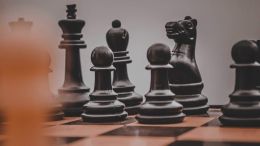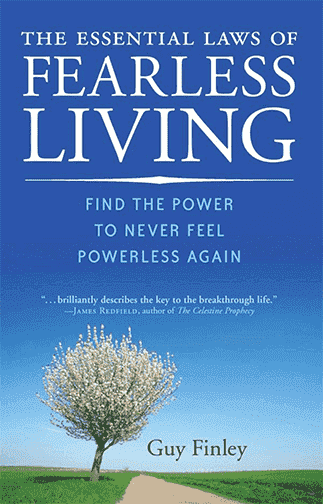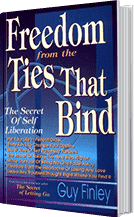Self-Observation
-
 Special Lesson
Special LessonThis Is What I Was Praying For?
- Posted: 11/13/23
- 508 words
- 0 View
- Comments (0)
Every one of us who has ever been thrust into some seemingly overpowering circumstance is more than equally empowered to understand the following: What we receive in those life moments amounts to our individual life experience... and what we experience as our individual life has to do with that level of life's possibilities that we embrace and ultimately express...
-
Multi
Format
 Short Talk
Short TalkOn the Other Side of the Resistance is the Flow
- Posted: 11/02/23
- Meeting: 07/19/23
- Time: 00:04:44
- 0 View
- Comments (1)
In this answer to a viewer's question, "letting go" author Guy Finley talks about the difference between observing a particular psychological condition -- such as feeling a lack of energy -- and resisting the condition.
-
Multi
Format
 Short Talk
Short TalkThis is What Unconscious Resistance Is
- Posted: 10/23/23
- Meeting: 07/16/23
- Time: 00:04:09
- 0 View
- Comments (0)
In this answer to a viewer's question, "letting go" author Guy Finley shares some insights about staying present as the observer of fast and furious thoughts, as opposed to getting pulled down into their world.
-
 Special Lesson
Special LessonA Good Indication That You Are Making Real Progress
- Posted: 10/17/23
- 353 words
- 0 View
- Comments (0)
Self-observation is the key to a higher order of awareness; it is how we learn to become inwardly vigilant to our own thoughts and feelings, even as they pass through us. When we can observe ourselves in this new way, our higher nature naturally prevails over any troubling thoughts or feelings that want to drag us down into their lower world...
-
 Special Lesson
Special LessonSee What You Can Learn About Depression
- Posted: 10/02/23
- 853 words
- 0 View
- Comments (0)
In the end, and to the point of this work we do, the journey is from outward to inward. The journey takes a person from "out there" (powers and possessions, travel, drugs, new hobbies, friends, relatives, approval, etc.) to an understanding that as long as they look to anything or anyone outside of themselves, it is never going to reconcile or bring an end to the overwhelming negative states such as fear that are wrecking their life.
-
Multi
Format
 Short Talk
Short TalkDo Not Oppose What Opposes You
- Posted: 08/31/23
- Meeting: 06/24/23
- Time: 00:06:25
- 0 View
- Comments (0)
Will you speak more about how resistance can be our ally to make peace with what is incomplete? How we can remain open when we feel attacked in that moment, not later when the light goes on and I hit my forehead, seeing the test to see if I learned to be open?
-
 Special Lesson
Special LessonLet Silent Seeing Free You from Struggling
- Posted: 05/02/23
- 774 words
- 0 View
- Comments (0)
No moment can be different than it is. We can't change a moment that comes. The moment (and its content) appears from within us, before us, and we are relegated to being able to see it but not to change the very thing that we're looking at as it appears. So that whether we like it or not actually means nothing.
-
Multi
Format
 Short Talk
Short TalkListen to This If You're Tired of Being Defeated
- Posted: 04/21/23
- Meeting: 03/26/23
- Time: 00:03:41
- 0 View
- Comments (0)
Self-realization author Guy Finley talks about how the unattended mind is the breeding ground of self-defeat. The unattended mind always goes into thought, hoping to reconcile the disturbance that thought created in the first place. Observing this dynamic as it takes place in the mind is how we rise above everything that has defeated us in the past.
-
 Special Lesson
Special LessonWelcome the Light of Truth into Your Inner Home
- Posted: 10/20/22
- 564 words
- 0 View
- Comments (0)
It seems natural to fear moments we don't want, to avoid any knock at the door of some untimely event. But it's not these moments themselves that we are afraid of: what we fear is our reaction to them, so that we can't see that this experience we don't want... is actually the pain of a negative reaction as it unfolds within us.
-
 Special Lesson
Special LessonOpen Your Eyes and Heart to Become One with What Is
- Posted: 09/29/22
- 362 words
- 0 View
- Comments (0)
The mind that wants to know the truth of something, and that's willing to do the work required for such a discovery, will inevitably find that for which it is searching; our highest aspirations are reflections of unrealized possibilities. All scripture, from the east to the West, confirms this timeless truth: We need only ask, and it shall be given.
-
Multi
Format
 Short Talk
Short TalkStop Being Afraid of Unwanted Moments
- Posted: 05/12/22
- Meeting: 04/27/22
- Time: 00:04:17
- 0 View
- Comments (0)
In this answer to a viewer's question, "Secret of Letting Go" author Guy Finley talks about staying awake and present to the pressure we feel to avoid unwanted events. There is nothing to fear because the awareness itself will put ourselves and everything else in its proper place.
-
Multi
Format
 Short Talk
Short TalkFind the Source of Freedom
- Posted: 04/08/22
- Meeting: 03/23/22
- Time: 00:03:38
- 0 View
- Comments (0)
In this answer to a viewer's question, "Secret of Letting Go" author Guy Finley talks about owning your own attention for the purpose of observing the painful tendency to blame everything outside of yourself as the cause of whatever is disturbing you.
















